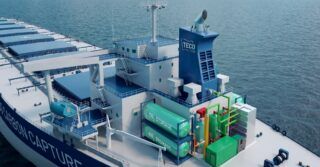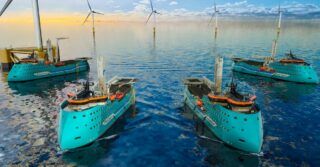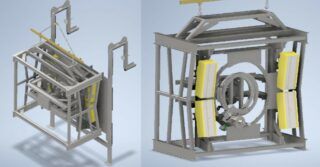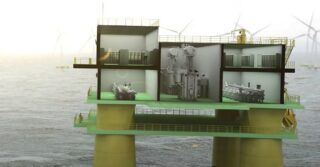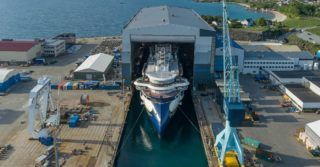In the pan-European project “Intelligent Secure Trustable Things” (InSecTT) under the Horizon 2020 program, the most innovative companies and research institutions are collaborating. They are working together to develop solutions that combine the Internet of Things (IoT) with artificial intelligence (AI). Three entities from Poland are also part of this initiative. The Gdynia-based startup ISS RFID, in collaboration with Gdańsk University of Technology and Vemco, is developing essential components for an intelligent seaport system.
The idea behind the InSecTT project is to provide complete and cost-effective solutions characterized by intelligent, secure, and reliable connections, as well as interoperability with other systems. Thanks to access to the latest radio technology advancements, international knowledge exchange, and collaboration with the academic world, ISS RFID will be able to implement advanced technological solutions in various industries in Poland.
Industry 4.0 is growing in Poland
ISS RFID and its partners aim to create a unified system for ports and floating units using active radio technologies and artificial intelligence. The system’s goals include locating objects and crew members, improving communication, including data exchange and analysis, and providing ships leaving ports, captaincies, and rescue services with information about equipment status and crew safety.
The concept of the system they are working on is based on connecting all elements, exchanging data from sensors, analyzing parameters, and making decisions with the support of artificial intelligence. Such solutions will also find applications in other branches of Industry 4.0. In the future, they will be introduced to their customers. Additionally, they are constantly growing and seeking engineers and programmers, and participating in projects like InSecTT offers opportunities for dynamic development of participants, says Jakub Kownacki, Technical Director of ISS RFID.
Business Collaboration with Science
The Gdańsk University of Technology, which coordinates the tasks of the Polish part of the consortium in the project, is convinced that equipping Polish ports with such innovative solutions will not only increase work efficiency and raise safety standards but also allow effective competition with foreign counterparts.
According to Professor Łukasz Kulasa, Ph.D., from the Department of Microwave and Antenna Engineering at the Faculty of Electronics, Telecommunications, and Informatics at the Gdańsk University of Technology, the Polish companies participating in the project, Vemco and ISS RFID, represent the elite among small and medium-sized enterprises.
These are dynamically growing companies that base their long-term growth and competitiveness on the development of innovative solutions. They will develop highly practical systems for Industry 4.0, utilizing genuine innovations for data integration, process management, and broadly defined access control, including RFID and IoT technology. Foreign companies are already interested in these products, he concludes.
InSecTT is an international project spanning three years, with 52 partners from 12 European Union countries and Turkey participating, with a budget exceeding 44 million euros. It aims to foster collaboration between large industrial companies, innovative SMEs, and cutting-edge research organizations and universities.
Questions for Dr. Eng. Łukasz Kulas, Prof. at Gdańsk University of Technology, Department of Microwave and Antenna Engineering, Faculty of Electronics, Telecommunications, and Informatics, Gdańsk University of Technology. Context – business collaboration with science, the InSecTT project.
What significance does participation in international research projects have for Gdańsk University of Technology?
The primary goal of academia is to seek answers and develop new solutions to issues that are essential for the overall development of societies. In the case of research conducted at a technical university, collaboration with industry is particularly important and serves as a distinguishing factor. It is expected that solutions created at technical universities should have practical applications. In their current activities, companies often encounter non-trivial problems.
For researchers, this is often an opportunity to propose new and practical solutions. Projects within large international company consortia provide us with a chance to understand the challenges faced by the global economy and an opportunity to develop new systems and algorithms, thereby enhancing the competitive advantage of European companies, especially Polish ones.
How do you perceive the role, significance, and know-how of Polish partners/companies in the InSecTT project?
Polish companies participating in the project – Vemco sp. z o.o. and ISS RFID sp. z o.o. – are undoubtedly among the elite of Polish small and medium-sized enterprises. They are rapidly growing companies with a stable market for their solutions and base their growth and competitiveness on the development of innovative solutions over the long term. These Polish companies will develop highly practical systems for Industry 4.0, utilizing innovative solutions for data integration, process management, and access control, including RFID and IoT technologies. These products are already attracting the interest of foreign companies.
What does the process of exchanging experiences and mutual learning between partners in this project look like?
In any large international project, technologies developed by partners, in this case, for secure and intelligent Internet of Things solutions, provide responses to important market needs and challenges. Large European companies operating in global markets need new solutions to maintain their competitiveness, especially when competing with international counterparts from China or the USA. Smaller companies and academic institutions often have the ability to quickly develop critical components of new systems, leading to strong synergies. Small companies, in general, have more limited sales opportunities for their solutions.
What values do partners/institutions from the scientific community bring to this process, and what do businesses, including startups, bring?
Technologies developed by Gdańsk University of Technology with innovative potential, such as a scalable location system based on reconfigurable antennas, are developed in close cooperation with smaller companies, including startups. This allows academic solutions to be quickly adapted to business realities, often requiring multiple modifications to previously developed prototypes.
Since we have also engaged Polish entities with specific needs in terms of improving their efficiency, such as hospitals and port areas, through the InSecTT project, we have a unique opportunity to conduct local pilots to further verify the benefits that organizations that decide to purchase new technologies can obtain. This will allow us to assess the effectiveness of the solutions and make decisions regarding their wider implementation.
What are your expectations during and after the completion of the task coordinated by Gdańsk University of Technology: Task 5.4 Intelligent wireless systems for smartport cross-domain applications (intelligent wireless communication systems for port solutions based on IoT and artificial intelligence)?
Polish ports generate significant revenue and require innovation to compete even more effectively with their foreign counterparts. This is currently our primary goal. It is worth mentioning that the largest European ports have several natural advantages, including easier access to technology.
Thanks to the InSecTT project, we have secured significant funding for the development of IoT and artificial intelligence solutions that we believe will improve the efficiency and safety of ports. We will also conduct initial pilot deployments, allowing us to evaluate the effectiveness of the solutions and make decisions about their broader implementation.
Is the environment of international research projects a good place for creating innovative ideas, solutions, and products ready for commercialization, or is it more effective within the R&D departments of companies or universities?
Our previous experiences in international research project collaborations show that international projects are challenging to execute and require a lot of work. Often, it involves stepping out of the comfort zone and subjecting oneself to critical evaluation by the international research and business community. In such projects, innovation and solutions are always considered in a global context.
On the other hand, international projects allow us to address global challenges that will be widely adopted within the next 5 years. This gives us enough time to develop our own solutions and technologies, which can then be further developed in collaboration with Polish companies. Importantly, solutions provided by Polish companies are likely to be much more cost-effective while maintaining the same level of quality as foreign counterparts, enabling us to build lasting competitive advantages based on innovation.
What profile and conditions should partners in international research projects meet to maximize their potential and thrive in such an environment?
Companies participating in the project must primarily base their growth and competitiveness on the long-term development of original innovative solutions. Openness to collaboration, willingness to tackle challenges, and having a stable market for their solutions are also important aspects, as the development of innovative original solutions is typically a lengthy and costly process.
What fundamental differences do you see between research/acceleration projects organized by Polish institutions and foreign ones?
National and international sources of funding complement each other. A good example is the development of our scalable location system. To develop the initial concepts of reconfigurable antennas, which are a key component of this system, we needed support from national programs like LIDER, run by NCBiR (2011-2013).
The most promising concepts gained interest from both national and international partners, leading to a joint project under the EU’s 7th Framework Programme, which resulted in the first prototype of the system (2014-2017). This prototype was further developed in another international project under the EU’s Horizon 2020 program, tailored to the needs of hospitals and care homes (2017-2020). Thanks to the InSecTT project, we will be able to conduct pilot installations in hospitals and adapt our system to new deployment areas, such as port areas and floating units, in close collaboration with ISS RFID sp. z o.o. as part of the Innoship program run by NCBiR.




